Chapter: 11th Nursing : Chapter 1 : Nursing - Origin and its Development
Evolution of Nursing
Evolution of Nursing
It can be divided into three
periods of time in history,
·
Early
Christian era
·
Middle
age
·
The
dawn of modern Nursing
Early Christian Era
Nursing in pre-Christian times,
religious beliefs has great bearing on the caring for the sick suffering.
Christianity believed that one should render services of love to humanity
without any reward. It was equal to one’s sincere love to god. This principle
was absorbed in nursing and helped to improve the status of a nurse. Some of
the examples of such women are as follows.
PHOEBE
·
First
deaconesses, intelligent and educated.
·
Best
nursing care for the sick in their homes.
·
Compared
to a modern public health nurse.
FABIOLA
·
Converted
her palace into a hospital.
·
Daughter
of a great Roman Noble.
·
She
collected the poor and sick from the streets in her place.
PAULA
·
Friend
of Fabiola.
·
She
built a hospital for strangers, pilgrims and travellers and for the sick.
·
Constructed
a monastery in Bethlehem.
MARCELLA
·
She
lead a group of high rank with freedom of women and induce them in works of
charity.
Middle age
Monks and nuns devoted their life
to the care and services of the poor and sick.
·
St.
Dominic (1170-1221)
·
St.
Francis of Assisi (1182-1226)
·
St.
Elizabeth of Hungary (1207-1231)
·
St.
Catherine Sienna (1347-1380)
Late in the 12th and 13th
centuries nursing become differentiated from medicine and surgery.
The Dawn of Modern Nursing
From the late 1700s through 1853,
the manner in which the sick were care. Remain essentially unchanged. In Europe
the dawn of Nursing was underway. The deaconess institutes of kaiserswerth,
Germany was established in 1836 by pastor Theodore Fliednes, to train the
Deaconesses to care for the sick and the provision of social influence
throughout the world.
Indroduction to modern nursing Florence Nightingale
Miss Florence Nightingale known
for her devotion to the services to the poor and the sick and is also aware of
what she did for humanity and to raise the status of nursing profession.
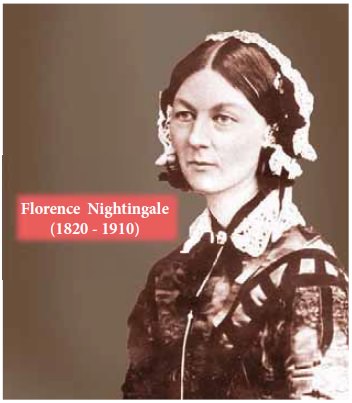
Florence Nightingale was born in a
wealthy English Family, on 12th may 1820. She had great desire to
become a nurse. She was dissatisfied with the daily routine life style of the
upper-class women. She had classical education which provided her with an
understanding of the circumstances of the world in which she lived. She became
aware of the inadequate care being provided in hospitals. She accompanied her
mother on visits to the ill patients at hospitals. She visited hospitals in
England and Europe.
She recognized that nurses require
·
Knowledge
·
Training
and
·
Discipline
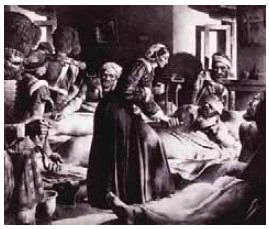
Nightingale was admitted to the
training program at the school at Kaiser Werth in1850s After her training, in
1853 she was appointed as superintendent of the institution for the care of the
sick gentlewomen in London. She had an opportunity to give her best services to
the wounded soldiers in the Crimean war in 1854, she attended thousands of
wounded and dying soldiers. For which she was righty known as “The Lady with
the Lamp”
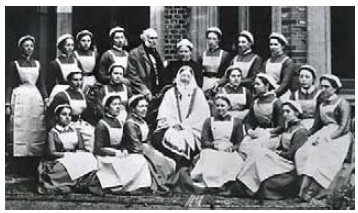
Miss. Nightingale introduced
numerous improvements in military hospitals, she also founded the first
training school for nurses St. Thomas Hospital at London in 1860. She shared
her ideas about Nursing and Nursing education. Florence Nightingale paved the
way for the ultimate recognition of nursing as a superior, compassionate
profession.
Miss. Nightingale was the first to
mention Holism (Treating the whole patient) in Nursing. Nightingale was the
founder of modern nursing education. She planned a complete public health
program. Despite her ill health, she worked for the development of nursing
services without tailing sufficient rest.
The Florence Nightingale Pledge
The modified Hippocratic Oath
arranged by Mrs. Lystra E. Gretter and her committee for the Farr and Training
School for Nurses, Detroit is called the Florence Nightingale Pledge as a token
of esteem for the Founder of Modern Nursing.
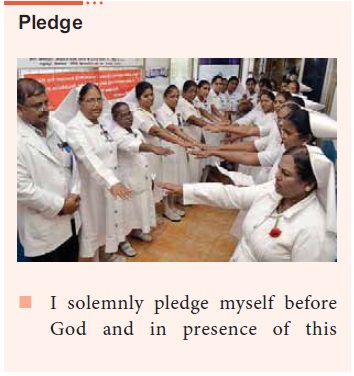
Nurses Uniform
When you think of a nurse, what
image comes immediately to mind? A lady in a crisp white frock, with a starched
white cloth apron, cap in her hair, wearing white rubber shoes, white socks and
white belt; the quiet essential image of standard nursing uniform for nurses
worldwide. However, the concept of nursing uniforms has changed now, with
nurses wearing scrub sets and other flexible clothing.
Nursing in the past Nightingale
era turned into a more respectable job with schooling systems and uniforms for
nurses. Nurses had to wear a hat and band to distinguish themselves as nurses
and display their nursing rank. Fresh nurse students would wear ribbon bands of
pink, blue, or other pastel colours. Senior nurses and nursing teachers would
wear black ribbon bands to indicate seniority.
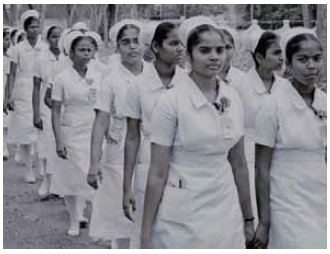
Related Topics